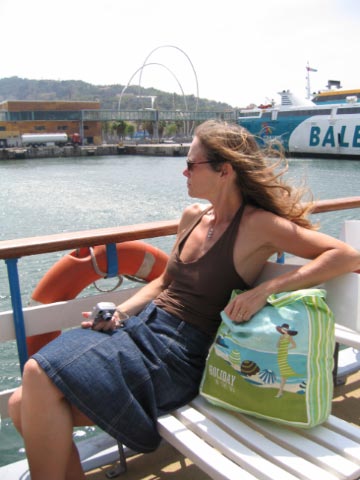miniStories: “Why It’s a Good Idea to Recite Poetry at the Bar” by Julia Klatt Singer
"Why It's a Good Idea to Recite Poetry at the Bar," a miniStories-winning submission by Julia Klatt Singer, was selected by writer and Lit 6 Project performer Stephanie Wilbur Ash.

Why Its a Good Idea to Recite Poetry at the Bar
Are you Finnish? he asks, pointing towards the book on the bar. It is a volume of Finnish short stories, titled Sampo, and an obvious give-away to anyone who knows Finnish. Tells me he plays the violin in the orchestra, and is embracing sadness. Leans in closer, asks if he can finish my beer, drinks it, then continuesits not valued here, sadnesswe are supposed to be happy, happy all the time.
I am happy, more happy than sad, most of the time, but say because I feel it, Lets be melancholy, but not togetherthat would be too depressing. Better to brood alone. The smile he gives me implies that he is not glum. He is lit up and talking fast.
Molly walks by, reminds us that the poetry recitation is next week, between sets. I am ready. Already know To Celia by heart.
Id recite a Keats, he saysnow, he was a melancholy guy.
And a romantic poet, I add. There is no romance without misery, I fear, but do not tell himalthough he does not seem easily frightened. He has just told me a story about a Finnish gypsy who approached him at a bar in Helsinki, said, she wanted to eat him alive. And she did, he said.
Ben Johnson was jilted, and I wonder if he tires of hearing his rejection repeated all these years. Makes me think I should be carefulmy words may haunt me, my failures march endlessly past. But I love the first six lines of To Celia, and even though it doesnt work out, they are worth, I believe, all his misery.
He tells me hell be in New York next week and will miss the recitation. Asks if Ill recite for him now.
I begin, Drink to me only with thine eyes and I will pledge with mine, or leave a kiss but in the cup and Ill not look for wine. The thirst that from the soul doth rise doth ask a drink divine
but might I of Joves nectar sup
but find that I cannot say these words with him gazing at me, pause and say, this is where I get lost.
Thats my favorite part. he says, smiling. The part where you get lost.
I try to take comfort in thisknow I cannot hide a single emotionhope if someone is watching me get lost, that they might be able to find me, for I may not be able to find myself.
I frown, and say, its the small words that trip me up.
We both frown, shrug, try melancholy on for size.
Be sad, he says, then, but carefree.
I realize he is talking to himself now, as much as to me. And I realize, this is the definition of jilted. I give him a sad smile, try my damnedest not to look happy that I finally figured something out.
About the author: Julia Klatt Singer writes fiction and poetry. She works as a visiting writer in the school through COMPAS. She is one of four writers who collaboratively wrote 12 Branches: Stories from St. Paul. She is a regular contributor to the TalkingImageConnection series, in which writers write in response to contemporary artwork. Her stories and poems have appeared in over three dozen journals. Ms. Singer lives in Minneapolis, Minnesota.